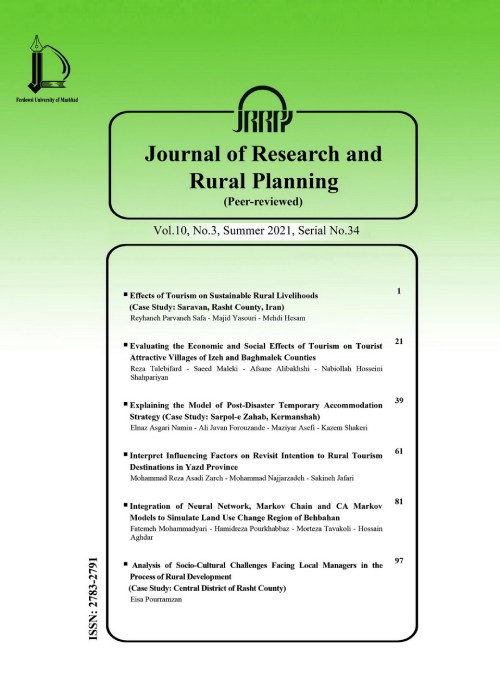Process Model of Rural Planning Based on the Experiences of Community-based Development Projects (The 2020s Projects in the Critical Centers of Sistan, Rigan and Jazmourian)
The implementation of participatory projects aiming socio-economic empowerment and environmental sustainability is one of the sustainable management strategies in arid rural areas across the world in the recent decades. This study was conducted to answer two questions: What have been the characteristics and achievements of participatory development and community-based projects in rural areas located within the critical centers of Sistan, Jazmourian, and Rigan? How is a process model for rural development planning consistent with the geography of aforementioned areas?
The present study is descriptive-analytical and the research process includes the analysis of the goals and final achievements of participatory plans in Rigan (RFLDL), the progress and development Plan in Ghaleh-Ganj, the Carbon Sequestration plan in Jazmourian and Lashar, the Menarid Project in Sistan, "Village without unemployed" project, SAHAB community-based projects, and ASEMAN project from Barekat Foundation in Sistan region. The required data consisted of the performance statistics of the above-mentioned projects, and the required analysis was conducted on the dat.
Each of these projects has positive achievements in accordance with its short-term goals. Although it is quantitatively desirable, they failed to continue to operate in a regular and stable planning process in rural areas. Execution of a process model for rural development planning requires institutional transformations and the establishment of an integrated facility direction system for the economic infrastructure of rural areas (with a focus on the value chain) and a series of previous and subsequent jobs in each chain.
Among the main limitations of reformation in the programs and continuous learning from past experiences are the effort of conductors in charge of implementing rural development projects to indicate the expected achievements by relying on seemingly favorable statistics with false documentation, and the weakness or lack of a public oversight system on the actual achievements of projects. Real decentralization in the country's rural planning system, the establishment of a public oversight system, and a process planning are the best strategies for sustaining local communities.
- حق عضویت دریافتی صرف حمایت از نشریات عضو و نگهداری، تکمیل و توسعه مگیران میشود.
- پرداخت حق اشتراک و دانلود مقالات اجازه بازنشر آن در سایر رسانههای چاپی و دیجیتال را به کاربر نمیدهد.


